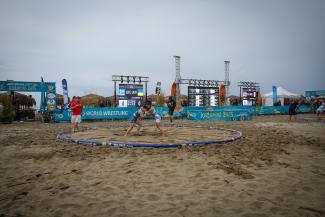Montano Wins First Wrestling Gold for Ecuador at Pan Am Games
Thursday, July 16, 2015 - 03:41 By William May


TORONTO, Canada (July 14) – Andres MONTAÑO (ECU) won Ecuador’s first gold medal in Greco-Roman wrestling at the Pan American Games on Wednesday with an 11-0 technical triumph over Ali SOTO (MEX).
Montaño converted an early takedown into a lift and turn for a 6-0 lead and then slammed the door on Soto with a bodylock takedown to the secure the gold medal.
It was the first gold medal for Ecuador in the classic style and first wrestling gold medal since 1971 when Sergio GONZALEZ (ECU) won the 48kg crown in freestyle in Cali, Colombia.

Meanwhile, U.S. wrestlers won two out of three in the gold medal finals as Andrew BISEK (75kg) and Jon ANDERSON (85kg) both dialed up technical falls in the finals.
Bisek converted in par terre with a chest-high gut wrench and lift to back-arching throw for a quick win over Alvis ALMENDRA (PAN), who takes home Panama’s first wrestling medal from the Games since 1991 despite the loss. Bisek outscored his opponents 25-0.

Anderson won his first Pan Am gold with a dominant tournament, matching Bisek’s output, beating opponents by a combined 25-0 score. Anderson pushed through Querys PEREZ (VEN) 9-0, finishing the bout with two takedowns.
Venezuela stands second in the medals table with one gold and one silver medal. Anderson won last year’s Pan Am Championships in Mexico City at 80kg.

Wuileixis RIVAS (VEN), the 2014 Pan Am champion at 71kg, gave Venezuela a wrestling gold medal for a second straight Games with a 13-1 technical fall win over Bryce SADDORIS (USA).
At 59kg, Cristobal TORRES (CHI) scored with a late go-behind takedown to sew up a 3-0 win over Dylan WILLIAMS (CAN) for one bronze medal.
Spenser MANGO (USA), the Pan American runner-up in April, flipped Jansel RAMIREZ (DOM) with a reverse waistlock and short lift in the first period and held on for a 6-3 win and the other bronze medal.
At 66kg, Miguel MARTINEZ (CUB), the gold medalist at the Pan Am Championships, scored with a go-behind takedown and bodylock before Jair Alexis CUERO (COL) defaulted. Mario MOLINA (PER) shook off an early four-point throw and forced a disqualification on Jefrin MEJIA (HON) in the second period for the second bronze.
Despite a disastrous opening session for Cuba, Martinez and Alan VERA (85kg) were able to secure a pair of bronze medals for the traditional Pan Am powerhouse.
Pan American runner-up Juan ESCOBAR (MEX) was the only wrestler to secure a fall in the medal matches Wednesday, when he stepped over an arm throw attempt by Luis AVENDANO (VEN) and pressed for the fall.
Greco-Roman Medal Match Results
59kg
GOLD: Andres MONTANO (ECU) df. Ali SOTO (MEX) by TF, 11-0
BRONZE: Cristobal TORRES (CHI) df. Dylan WILLIAMS (CAN), 3-0
BRONZE: Spenser MANGO (USA) df. Jansel RAMIREZ (DOM), 6-3
66kg
GOLD: Wuileixis RIVAS (VEN) df. Bryce SADDORIS (USA) by TF, 13-1
BRONZE: Miguel MARTINEZ (CUB) df. Jair Alexis CUERO (COL) by Default (6-0)
BRONZE: Mario MOLINA (PER) df. Jefrin MEJIA (HON) by Disqualification (9-4)
75kg
GOLD: Andrew BISEK (USA) df. Alvis ALMENDRA (PAN) by TF, 8-0
BRONZE: Carlos MUNOZ (COL) df. Maximiliano PRUDENZANO (ARG), 4-3
BRONZE: Juan ESCOBAR (MEX) df. Luis AVENDANO (VEN) by Fall
85kg
GOLD: Jon ANDERSON (USA) df. Querys PEREZ (VEN) by TF, 9-0
BRONZE: Cristian MOSQUERA (COL) df. Alfonso LEYVA (MEX) by TF, 8-0
BRONZE: Alan VERA (CUB) df. Oscar MARTINEZ (HON) by TF, 9-0


Share your thoughts.
Comments